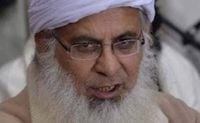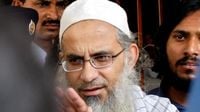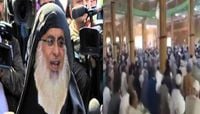In a significant and controversial address, Maulana Abdul Aziz Ghazi, the cleric of Islamabad's Lal Masjid, openly criticized the Pakistani government and military, accusing them of bombing their own citizens in regions like Balochistan and Khyber Pakhtunkhwa. This speech, recorded on May 2, 2025, has rapidly circulated on social media, highlighting a growing discontent even among hardline factions in Pakistan.
During the speech, Ghazi posed a provocative question to his audience: "If India and Pakistan go to war, how many of you will support Pakistan?" The response was stark; not a single hand was raised. Ghazi remarked, "This means many are enlightened now," indicating a shift in public sentiment towards the government and military.
The context of Ghazi's remarks comes amid heightened tensions between India and Pakistan, particularly following the horrific Pahalgam terror attack on April 22, 2025, where 26 people, primarily non-Muslim tourists, were killed by armed terrorists linked to The Resistance Front (TRF), an offshoot of the Pakistan-based Lashkar-e-Taiba (LeT). The attack has led to severe diplomatic repercussions for Pakistan, including the suspension of the Indus River water-sharing treaty and the closure of the Attari-Wagah border, crucial for trade and travel between the two nations.
Ghazi's critique of the Pakistani state was sharp and unyielding. He stated, "Today, the system in Pakistan is a system of disbelief (kufr), a tyrannical system, worse than that of India. There isn’t as much oppression in India as there is in Pakistan." His remarks reflect a deepening disillusionment with the current regime, led by Prime Minister Shehbaz Sharif, which he described as a "cruel, useless system."
He further elaborated on the plight of citizens in Pakistan, asking, "Does India bomb its own citizens? Are people disappearing in India like they are in Pakistan?" Ghazi pointed to the enforced disappearances reported across the country, emphasizing the dire situation faced by many Pakistani families. "Here, people are exhausted from staging protests in search of their loved ones. Here, clerics are missing, journalists are missing, Tehreek-e-Insaf members are missing," he lamented.
The Lal Masjid, where Ghazi serves as Imam and Khatib, has a notorious history in Pakistan. Established in 1965, it became a focal point for radical Islamist ideology, particularly under the leadership of Abdul Aziz and his brother, Abdul Rashid Ghazi. The mosque was at the center of a violent confrontation with the Pakistani military in July 2007, known as Operation Sunrise, which aimed to dislodge armed students and radical clerics. This operation resulted in significant casualties and marked a turning point in Pakistan's struggle with extremism.
In his speech, Ghazi recalled the siege of Lal Masjid, asking rhetorically, "Did the Lal Masjid tragedy happen in India?" This historical reference underscores the mosque's complex legacy, symbolizing both the rise of radicalism and the state's attempts to control it. The cleric's remarks resonate with a broader narrative of frustration and anger towards the government, especially among those who once aligned with its ideologies.
As tensions between India and Pakistan continue to escalate, with Pakistan's Defence Minister Khawaja Asif warning of potential military strikes from India in retaliation for the Pahalgam attack, Ghazi's speech could signify a turning point in public opinion. His call for introspection among Pakistanis, urging them to reconsider their support for a government that he claims oppresses its own people, may reflect a broader sentiment that could challenge the established narrative.
The implications of Ghazi's words are profound. His questioning of national loyalty, especially in the context of a potential war, challenges the very foundations of how Pakistanis view their relationship with their government and military. As he noted, the lack of hands raised in response to his question could indicate a significant shift in public consciousness, suggesting that many are beginning to question the motives and actions of those in power.
Furthermore, the backlash against the Pakistani military and government is not isolated to Ghazi's speech. It reflects a growing trend among various segments of the population, including those who traditionally supported hardline stances. This disillusionment could have far-reaching effects on Pakistan's political landscape, especially as the country grapples with internal strife and external threats.
In conclusion, Maulana Abdul Aziz Ghazi's recent address at Lal Masjid has sparked significant discussion and reflection among Pakistanis regarding their government's actions and the ongoing conflict with India. His bold assertions and the silence of his audience serve as a stark reminder of the complexities facing the nation today, as citizens weigh their loyalty to a state they perceive as increasingly tyrannical against the backdrop of historical grievances and current crises.



